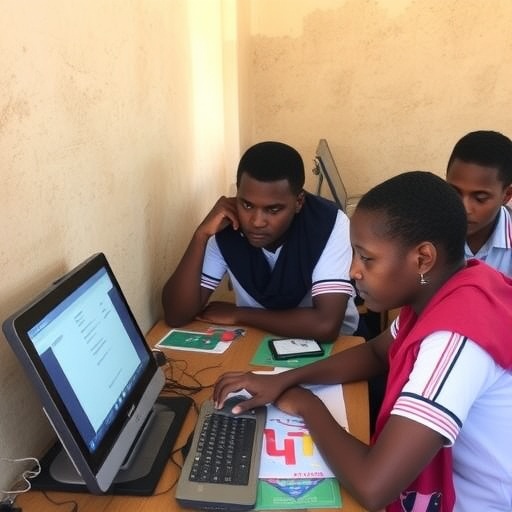In recent years, the integration of Information and Communication Technology (ICT) in education has emerged as a critical factor shaping teaching and learning processes worldwide. A significant study conducted in the Amhara region of Ethiopia has provided valuable insights into the factors influencing the utilization of ICT in public secondary schools. This research by Kebede, Gebremeskel, and Nigatu sheds light on how various antecedents impact the incorporation of modern technological resources in the classroom.
The landscape of education is undergoing a transformative shift, driven predominantly by the advancements in technology. Educators are beginning to recognize the importance of leveraging ICT to enhance learning outcomes and facilitate a more dynamic and engaging teaching environment. However, the effectiveness of these technologies is contingent upon a range of factors that can either support or hinder their adoption in educational settings.
The study highlights that one of the critical antecedents of ICT utilization is the availability of resources. It is essential that schools possess the necessary infrastructure, such as reliable internet access, sufficient hardware, and appropriate software. In many cases, Ethiopian public secondary schools have faced challenges related to inadequate resources, which in turn affects teachers’ motivation to integrate technology effectively into their pedagogical strategies.
Moreover, professional development plays a crucial role in the successful implementation of ICT in teaching. Comprehensive training programs are needed to equip educators with the skills and knowledge necessary to utilize technological tools effectively. The study emphasizes that ongoing professional development can help teachers become more confident and capable when integrating ICT into their curriculum, ultimately benefiting students’ learning experiences.
Another significant factor identified in the research is the attitude of educators towards technology. Teachers who possess a positive disposition towards ICT are more likely to incorporate these tools into their teaching practices. The study found that when teachers see the value in using technology for educational purposes, they are more inclined to experiment with new methods and seek innovative solutions to enhance their teaching.
Furthermore, the study delves into the importance of administrative support in fostering an environment conducive to ICT utilization. School leaders play a pivotal role in promoting the integration of technology in the classroom. When administrators are supportive of ICT initiatives, providing the necessary resources and encouragement, teachers are more likely to embrace technological change.
Peer collaboration is yet another element that influences the integration of ICT in teaching. When educators work together, share best practices, and support one another, they create a community of practice that fosters innovation. The research shows that collaborative efforts among teachers are instrumental in overcoming challenges related to ICT adoption and sustaining momentum in technology integration initiatives.
The curriculum itself is a vital consideration, as it must allow for the integration of ICT in a meaningful way. The study suggests that when curricular frameworks are aligned with technological advancements, it promotes a more seamless incorporation of digital tools in the learning process. However, outdated curricula can pose barriers to effective ICT utilization, making it essential for educational stakeholders to engage in continual curriculum development efforts.
In addition to these factors, the socio-economic context of the region plays a significant role in shaping educational practices. The study highlights the disparities in access to technology between urban and rural schools in Amhara, which can impact the overall effectiveness of ICT utilization. Addressing these inequities is crucial for creating an inclusive educational environment where all students have the opportunity to benefit from technological advancements.
Cultural perceptions of technology also influence its acceptance within educational settings. The research indicates that societal attitudes toward ICT can either facilitate or constrain its integration into teaching practices. As communities evolve and become more technologically savvy, it is essential to foster a cultural shift that embraces innovation and supports technology adoption in schools.
The findings of this study are vital for policymakers and educational leaders aiming to enhance the quality of education in Ethiopia and beyond. By understanding the antecedents that promote or inhibit ICT utilization, they can create targeted interventions that address these challenges and provide sustainable solutions for integrating technology in teaching and learning.
In conclusion, the research underscores the importance of a multifaceted approach to ICT integration in education. It is not solely about providing access to technology; rather, a comprehensive strategy that encompasses resource allocation, professional development, administrative support, curriculum alignment, peer collaboration, socio-economic considerations, and cultural attitudes towards technology is essential. By focusing on these antecedents, educational stakeholders can work collectively to harness the potential of ICT in transforming the teaching and learning landscape in schools across Ethiopia and beyond.
This study represents a significant contribution to the discourse surrounding ICT in education, offering actionable insights and recommendations that can lead to more effective teaching practices and improved student learning outcomes. As technology continues to evolve, the need for adaptive and responsive educational frameworks becomes increasingly apparent. Stakeholders must remain committed to fostering a culture of innovation in schools, ensuring that both educators and students are equipped to thrive in an increasingly digital world.
Subject of Research: The factors influencing ICT utilization in teaching and learning in public secondary schools in Amhara, Ethiopia.
Article Title: Antecedents of ICT utilization in teaching and learning: a study of public secondary schools in Amhara, Ethiopia.
Article References:
Kebede, S.G., Gebremeskel, M.M. & Nigatu, S.T. Antecedents of ICT utilization in teaching and learning: a study of public secondary schools in Amhara, Ethiopia.
Discov Educ 4, 440 (2025). https://doi.org/10.1007/s44217-025-00901-z
Image Credits: AI Generated
DOI: 10.1007/s44217-025-00901-z
Keywords: ICT utilization, education, Ethiopia, public secondary schools, teaching and learning.




